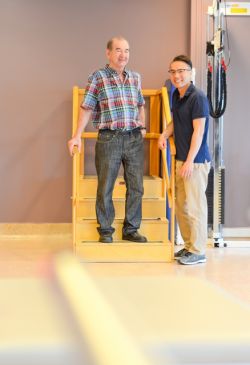Working Towards a Common Goal

David Hirsch walks over to the Stroke Clinic waiting area and hands his daughter Sharon Gomes a few pieces of paper. He just finished his appointment with Occupational Therapist Theresa Kennedy and she has given him some homework – brain teasers to help improve his visual and short term memory. He briefly explains to his daughter what he was asked to do before heading off with Physiotherapist Ray Dang for his session.
“He really enjoys working with all the different people here. They’re nice to him. He feels special,” explains Sharon. “These visits have been great for him because it’s helping build his confidence.”
Five years ago, David had a stroke. He was cared for in a couple acute care hospitals before he was transferred to another organization for rehab and to get him walking again.
Since then, he has had a few falls and accidents.
“About a year ago, a doctor at Michael Garron Hospital suggested Dad come to Providence for what he called a ‘tune up’. Until then, we hadn’t heard about Providence for rehab or outpatient services,” Sharon says. “My dad used to come here years ago when he would pick up Meals on Wheels for deliveries and, over the years, we’ve had some friends here in palliative, but we always thought Providence was just for seniors that were inpatients.”
When David came for his appointment, he was nervous not knowing what to expect. “We went to see the doctor in Assess and Restore and then the Falls Clinic. The staff assessed him and suggested we go to the Stroke Clinic because of his stroke history.”
On his first visit at the Stroke Clinic, he met with members of the interprofessional team where they started to get to know David personally. “We want to know our patients and what their goals are for coming… what they want to achieve,” says Luz Salera, Registered Nurse for the Stroke Clinic. “From that discussion, we book individual appointments for a fuller assessment – this way, each therapist can plan what activities they need to help them achieve their goals.”
From there, the care plan is developed and initial appointments scheduled. David meets with other members of the Stroke Clinic team – Speech Language Pathologist Vibhuti Jethava and Therapeutic Recreationist Mary Scarborough – to round out his therapy.
Luz says, “We encourage family like David’s daughter to be here. Appointments are not enough, you need to practice and family often help with this and our patients respond. I think it’s because we treat them just like anyone else in the community. This makes a world of difference.”
A positive difference that Sharon credits with helping her dad flourish. “Two days ago, he walked from his house (about 20 minutes away) to mine to bring my kids (his grandchildren) some fruit. Then he invited them for dinner,” she shakes her head, smiling. “He’s upbeat, he’s more himself these days. My girls (19 and 22) said it was the best visit ever!”
As they get closer to the end of David’s sessions, the pair are working with the clinic team to link with community resources, senior groups and other stuff for David to take part in.
“One thing they did here, they validated what he was feeling and it helped him to feel normal. That has made a huge difference,” says Sharon.
